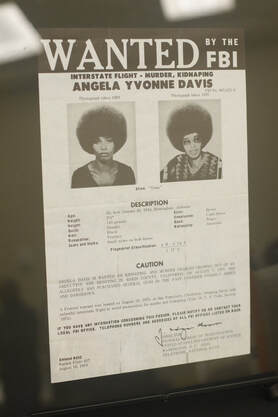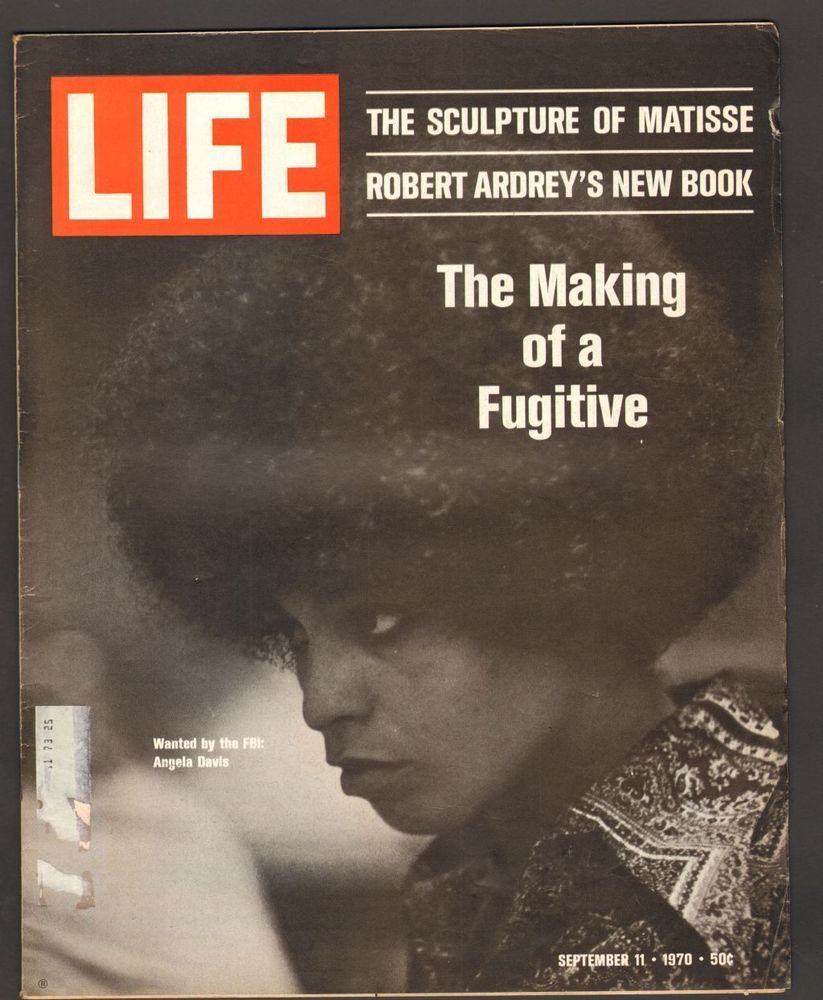CR149, CR 196
Angela Davis (1944 - )
FBI Wanted Poster 1970
LIFE Magazine September 11, 1970 The Making of a Fugitive Angela Davis
Angela Davis was born on January 26, 1944, in the “Dynamite Hill” area of Birmingham, Alabama. The area received that name because so many African American homes in this middle class neighborhood had been bombed over the years by the Ku Klux Klan. Davis’s mother was active in the NAACP, when it was dangerous to be openly associated with the organization because of its civil rights activities. As a teenager, Davis moved to New York City with her mother, who was pursuing a master’s degree at New York University.
In 1961 Davis enrolled in Brandeis University in Waltham, Massachusetts earning her B.A. (magna cum laude) in 1965. Even before her graduation, Davis, so moved by the deaths of the four girls killed in the bombing of Sixteenth Street Baptist Church in her hometown in 1963, that she decided to join the civil rights movement. By 1967, however, Davis was influenced by Black Power advocates and joined SNCC and then the Black Panther Party. She also continued her education, earning an M.A. from the University of California at San Diego in 1968. Davis moved further to the left in the same year when she became a member of the American Communist Party.
In 1969, Angela Davis was hired by UCLA as an assistant professor of philosophy, but her involvement in the Communist Party led to her dismissal. During the early 1970s, she also became active in the movement to improve prison conditions for inmates. That work led to her campaign to release the “Soledad (Prison) Brothers, two Black Panther Party members, George Jackson and W. L. Nolen, who were incarcerated in the late 1960s.
On August 7, 1970, Jonathan Jackson, the younger brother of George Jackson, attempted to free prisoners who were on trial in the Marin County Courthouse. During this failed attempt, Superior Court Judge Harold Haley and three others, including Jonathan Jackson, were killed. Although Davis did not participate in the actual break-out attempt, she became a suspect when it was discovered that the guns used by Jackson were registered in her name. Davis fled to avoid arrest and was placed on the FBI’s most wanted list. Law enforcement captured her several months later in New York. During her high profile trial in 1972, Davis was acquitted on all charges.
The incident nonetheless generated an outcry against Davis. Ronald Reagan, then governor of California, Reagan campaigned to prevent her from teaching in the state university system. Despite the governor’s objection, Davis became a lecturer in women’s and ethnic studies at San Francisco State University in 1977. In the political arena, Davis ran unsuccessfully in 1980 and 1984 on the Communist Party ticket for vice president of the United States. Davis continues to be an activist and lecturer as Professor Emeritus of History of Consciousness and Feminist Studies at the University of California at Santa Cruz.
In 1961 Davis enrolled in Brandeis University in Waltham, Massachusetts earning her B.A. (magna cum laude) in 1965. Even before her graduation, Davis, so moved by the deaths of the four girls killed in the bombing of Sixteenth Street Baptist Church in her hometown in 1963, that she decided to join the civil rights movement. By 1967, however, Davis was influenced by Black Power advocates and joined SNCC and then the Black Panther Party. She also continued her education, earning an M.A. from the University of California at San Diego in 1968. Davis moved further to the left in the same year when she became a member of the American Communist Party.
In 1969, Angela Davis was hired by UCLA as an assistant professor of philosophy, but her involvement in the Communist Party led to her dismissal. During the early 1970s, she also became active in the movement to improve prison conditions for inmates. That work led to her campaign to release the “Soledad (Prison) Brothers, two Black Panther Party members, George Jackson and W. L. Nolen, who were incarcerated in the late 1960s.
On August 7, 1970, Jonathan Jackson, the younger brother of George Jackson, attempted to free prisoners who were on trial in the Marin County Courthouse. During this failed attempt, Superior Court Judge Harold Haley and three others, including Jonathan Jackson, were killed. Although Davis did not participate in the actual break-out attempt, she became a suspect when it was discovered that the guns used by Jackson were registered in her name. Davis fled to avoid arrest and was placed on the FBI’s most wanted list. Law enforcement captured her several months later in New York. During her high profile trial in 1972, Davis was acquitted on all charges.
The incident nonetheless generated an outcry against Davis. Ronald Reagan, then governor of California, Reagan campaigned to prevent her from teaching in the state university system. Despite the governor’s objection, Davis became a lecturer in women’s and ethnic studies at San Francisco State University in 1977. In the political arena, Davis ran unsuccessfully in 1980 and 1984 on the Communist Party ticket for vice president of the United States. Davis continues to be an activist and lecturer as Professor Emeritus of History of Consciousness and Feminist Studies at the University of California at Santa Cruz.




